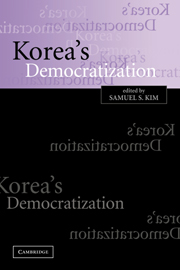Book contents
2 - Mass Politics, Public Opinion, and Democracy in Korea
Published online by Cambridge University Press: 29 July 2009
Summary
The Republic of Korea (hereafter “Korea”) has been widely regarded as one of the most vigorous and analytically interesting third-wave democracies. During the first decade of democratic rule, Korea has successfully carried out a large number of electoral and other reforms to transform the institutions and procedures of military–authoritarian rule into those of a representative democracy. Unlike many of its counterparts in Latin America and elsewhere, Korea has fully restored civilian rule by extricating the military from power. As in established democracies of North America and Western Europe, free and competitive elections have been held regularly at all the different levels of the government. In the most recent presidential election, held on December 18, 1997, Korea also established itself as a mature electoral democracy by elevating an opposition party to political power. In Korea today, there is general agreement that electoral politics has become the only possible political game in town.
The successful establishment of electoral democracy cannot, however, be equated with the consolidation of democratic rule. To become consolidated, a new democracy, like the one in Korea, must achieve deep, broad, and unconditional support among the mass public as well as political elites. Moreover, its performance must be accountable and responsive to public demands and preferences. The main objective of this chapter is to examine why and how the Korean people reacted to democracy during the course of the recent economic crisis. How do ordinary Koreans understand democracy?
- Type
- Chapter
- Information
- Korea's Democratization , pp. 47 - 78Publisher: Cambridge University PressPrint publication year: 2003
- 3
- Cited by



